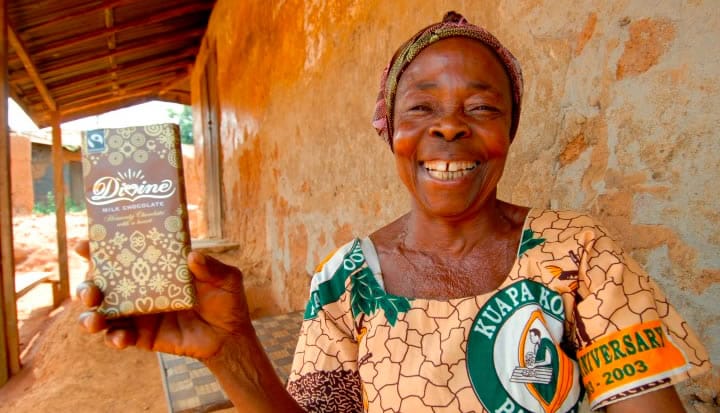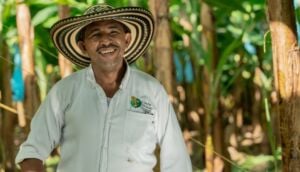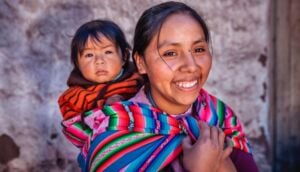An interview with Charlotte Borger, Communications Director, Divine Chocolate
1. How does Divine Chocolate work with women in your supply chains? (If you have any specific examples of women being empowered by project(s) you have run, or as a result of your efforts, please mention here).
Divine Chocolate is a UK based Fairtrade chocolate company 44% owned by the farmers of the Kuapa Kokoo co-operative in Ghana. In addition to delivering the Fairtrade minimum price guarantee, Fairtrade premium and 44% of distributed profit, Divine also invests 2% of its annual turnover in Kuapa Kokoo’s most progressive projects (Producer Support and Development Fund).
From its initial foundation in 1993 (Divine was established later in 1998), Kuapa Kokoo has prioritised gender equality, ensuring that women have equal standing as members and land owners, with quotas ensuring they are represented on all committees in the organisation.
Divine’s Producer Support and Development Fund (PS&D) has been used to develop a variety of training programmes for women designed to build their skills and confidence – enabling them to take on more roles (and more responsible roles) within the co-operative. A key testament to the effectiveness of these programmes has been ultimately the election of two women presidents, and a high representation of women on Kuapa’s National Executive Committee.
2 .Why does Divine Chocolate see gender equality and women’s empowerment within the supply chain as an important issue?
Divine’s company mission is to improve the livelihoods of cocoa farmers, and ultimately ensure a future for smallholder cocoa farming. We see women’s empowerment as key to this mission – as the African Proverb says “…educate a woman and you educate a nation.”
Through education and growing confidence, women can build their own economic independence, their active contribution to their communities, with equal opportunity to take leadership roles. As more women are thus empowered, they provide role models for more women to believe that they too can do more, and, importantly, for their daughters too.
3. What are the biggest challenges facing women in the areas in which you operate?
They have to do everything – i.e. all domestic duties, and childcare as well as running and working on their own farms
They have much lower literacy levels. We have seen women’s illiteracy levels at 85% (compared with men’s illiteracy at 65%)
They are observing centuries of tradition and cultural mores – that’s the way it’s always been
4. How have you addressed these challenges and what success have you seen?
Divine has invested in an adult literacy and numeracy programme which is primarily aimed at women (though men can also attend). Currently the programme is running in 8 villages and involves three 2 hour lessons per week. These skills will be key in being candidates to be elected for roles such as Recorder, Treasurer or Secretary at the village society level, and also in more confidently running their own income generating businesses.
We are ensuring we are working in liaison with the appropriate agencies on the ground, and this programme is run in collaboration with the Ghana Government’s Department for Non Formal Education.
Attendance levels are very high and women very quickly realise the potency of their new skills and can apply them very quickly, which motivates further attendance and desire to acquire greater knowledge. It also has an immediate impact on how highly they regard the need for their children (especially their daughters) to attend school.
5. What are your future plans for this work?
We intend to continue a process of review, revise and expand.
We have already ensured that teaching materials are revised to make them more accessible and relevant, to the Ghanaian cocoa farmers, and teaching in their local language Twi.
6. What are Divine Chocolate’s key learnings from your work in this area that other businesses could benefit from?
Be sure to set up and run a programme like this in collaboration with the proposed recipients. Divine has worked closely with the farmers from the start to ensure the programme meets their declared needs
Carefully consider when and where to run the lessons. It is important that people have the ability to attend regularly so the location needs to be easily accessible, and timings need to not conflict with peak farming periods, and special days or events
Ensure vital facilities – for example electricity for lighting
Make the programme relevant – the more immediately relevant it is for the participants the more they will immediately apply learning in their everyday lives, and the more they will retain what they learn
Start at the right level – you need to assess carefully what ability level people are at, and start from that level
7. The Fairtrade Foundation recently released its report on gender in the supply chain ‘Equal Harvest’. Do you agree with the key messages[i] and would you say that they apply to the work that you have been doing?
Divine agrees with the key recommendations of Fairtrade’s ‘Equal Harvest’ report, and Divine is either working actively on them, or supporting our partners in working on them. It is important to note that Divine is working with women as farmers, and not as separate to the supply chain, and in doing so supporting them to earn more from farming.
It would be good to ensure that, at the same time as promoting these recommendations, it is always important to promote the many benefits that empowering women has not just for the women themselves, but for a family, an organisation, a community, or a nation.
8. The SDGs encourage collaborative working and partnerships between private sector, public, and civil society to address all of the issues they raise. Please could you speak briefly of collaborations you have led or been involved in, focusing on gender, and what future opportunities you can see?
This programme is an excellent example of a collaborative approach to meeting an SDG. It is carried out as a collaboration between Divine Chocolate, Twin (the NGO that specialises in working with smallholder farmers and has worked with Kuapa since its inception), Kuapa Kokoo and the Ghana Government’s Department for Non-formal Education have together created and implemented this programme.
Kuapa has also run programmes, with Divine and Twin, designed to teach a variety of income-generating skills to women, enabling them to enhance income from farming with product sales at the local markets.
9. Aside from yourselves, which other companies do you see as making progress in the mission for gender quality and empowerment, and who would you say is the leader in the field?
Liberation Nuts; Tropical Wholefoods; Twin; Cafédirect; Divine… These companies are all equally leading in this field.
10. Goal 5 of the Sustainable Development Goals (SDGs) is “Achieve gender equality and empower all women and girls”. How far do you see the SDGs as an interdependent, cohesive framework, and this goal in particular guiding the way you carry out gender empowerment work in the future?
Divine considers it of major importance and significance that this goal has been clearly articulated and that there is an increased onus on private companies, NGOs, and Governments to deliver on it this time around.
We would like to add that it is vital that programmes designed to achieve this goal be customised carefully to the circumstances that each group of women finds themselves, with advice and input from the women themselves.
[i] Fairtrade Foundation’s Equal Harvest report, March 2015. Summary of key recommendations for supply chain businesses:
- Invest in gender analysis of supply chains
- Develop gender equality policies and action plans
- Develop internal capacity and responsibility on gender
- Support SPOs to develop and implement their own gender equality action plans
- Develop appropriate indicators and processes for monitoring progress internally and explore how the business can support the UN Global Compact Women’s Empowerment Principles in the supply chain
- Collaborate with other businesses, women’s organisations and development agencies
- Seek opportunities to raise awareness of women’s contribution to production










